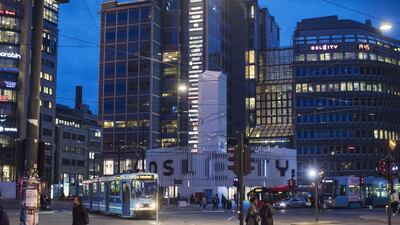The man running the world’s biggest sovereign wealth fund is trying to figure out just how much damage an all-out global trade war might do to his portfolio.
Yngve Slyngstad, the 55-year-old chief executive of the $1 trillion (Dh3.6tn) Norwegian fund, oversees investments in more than 70 countries and 9,000 companies across the globe. With that kind of exposure to the global economy, he is analysing the signals coming from the United States and China more closely than most.
“It’s quite possible there will be a rupture in trade,” Mr Slyngstad said.
The fund, which invests Norway’s oil wealth abroad, was created to reap the fruits of globalisation and the growth it drives. The investor owns about 1.4 per cent of global stocks and sticks closely to indexes, making it hard to avoid disruptions to the global economy when they hit.
Mr Slyngstad is concerned about the fate of China in this new world order. But he also questions the future of the global supply chains that make manufacturing tick and on which companies such as Apple rely to make iPhones in China.
“The interesting part long-term is if the global supply chains will become reconfigured,” he said. “Whether that’s actually going to become two regional ones, one centered on the US and another centered on China, or are we still going to have a globalised supply chain as we have today.”
The fund has spent recent years trying to spread its investments more evenly across the world, building a roughly 10 per cent stake in emerging markets and even moving into frontier markets. The fallout of the trade war was hard to miss in its second-quarter report, when the fund lost 5.7 per cent in emerging market stocks and 4 per cent on Chinese equities.
The fund has few places to hide from a trade war, but it remains committed to its goal of spreading investments. “We just invest an equal slice all over the world,” Mr Slyngstad said.
The fund’s investment horizon is very long term, and builds on an expectation that ethical choices here and now actually make good economic sense further down the road. Looking several generations ahead, the fund expects attention to ocean management and protecting the climate to offer financial rewards. It already excludes coal, and has proposed dumping all its oil and gas stocks to reduce Norway’s overall exposure to oil. This is currently under review by the Norwegian government.
________________________
Read more:
Britain's Labour party threatens to vote down any Brexit deal
New businesses spurring diversification for oil-producing states
China calls off trade talks with the US
________________________
There’s no conflict for the fund between saving the environment and chasing good returns, according to Mr Slyngstad. It only has one long-term aim: “That’s trying to make money.”
“We just think about it in a very long term,” he said. “That’s why we kind of look at the bigger risk picture.”
One risk that hasn’t fazed the fund is Brexit. The investor has continued to invest in the UK and London, where it owns large swaths of real estate, including much of Regent Street.
“Our confidence in London is strong,” Mr Slyngstad said. “Not first of all as a financial centre but as a world capital. There’s a lot of activity that goes on there that is key and crucial for the world economy so we will be long-term investors in London and the UK in general.”
As for the rest of its expansion into global cities around the world, that has slowed down a bit in recent years. The fund has a $26 billion real estate portfolio that it wants to build up to about 7 per cent of its assets.
“We haven’t really found pricing that attractive these days so we haven’t invested that much for the last couple of years,” he said.

